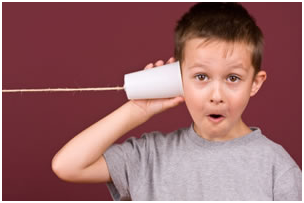Lesson 2: Your First Experiences
Attention

Learning Outcomes
Upon completion of this lesson's material, students will be able to
-
Relate and reflect on the significance of language, literacy and literature in early childhood.
-
Identify and explain the barriers that can impact language and literacy development.
-
Explain the importance of play in language and literacy development.
Teaching
Early language and literacy development is closely tied to the relationships we have and activities we do as children. As discussed in our last lesson, your earliest experiences with language and literacy lay the groundwork for your successes and can also create some barriers. Although your early childhood experience with language and literacy is only one factor that contributed to your development, it is important to recognize how your experiences influence your current beliefs and values. By digging deep and thinking back to those early experiences you had with language, literacy, and literature, you become aware of your own feelings and barriers that could prevent you from making developmentally appropriate decisions in practice.
Example
I do not remember my parents reading to me and having me read to them. Book reading was not a shared event in my house but it was present. I have fond memories of watching my father read these ridiculously thick books every night as he relaxed into his recliner. I remember the way he played with his eyebrow while he concentrated on the pages and ignored the rest of the world around him. Then, only minutes later, he would be snoozing in his chair, his book lying on his chest where it fell out of his hands. Because I did not have a strong base for what books sounded and felt like before kindergarten, I struggled a bit. Reading buddies in Kindergarten was my first experience with reading with others on a regular basis. I reverted to silliness and it took some time before I was engaged with reading at school. It did not take me long to enjoy reading by myself though. Once I learned how, I always associated books with winding down at the end of the day. Reading time was peaceful for me and an escape before I drifted off to sleep. This is only ONE example of how literature played a role in my childhood.
For discussion A, I want you to think about how language, literacy AND/OR literature was a part of your relationships and activities as a child. Think about how it made you feel and how it has impacted the educator you are today or aspire to be. If there was a barrier explain how you have processed through this and overcame or wish to overcome. It is only through self-reflection and processing that we are able to recognize what we bring to an interaction and be aware of how to implement developmentally appropriate practice.
For Discussion B, read The Beginnings of Literacy. Many might argue that play is all children do in early childhood settings but for those of us who are in this field know that play is much more than something kids do just to occupy their time. Play is tool, an outlet for learning. Play is where writing and reading begin. Through pretending to read a sign on the playground or write a letter to Grandma, children are trying to make sense of reading and writing long before they can actually do it. An infantís early scribbles create interest because they made something that wasnít there before. They develop motor skills in handling the utensil and having the power to move it over the paper. When they receive praise for their efforts they feel good about what they are doing and thus begins a possible love of writing and drawing.
For the assignments, you will need to read:
The Beginnings of Literacy
Assessment
Lesson 2 Discussion A - Recognizing and reflecting on the barriers of language and literacy development
Think back to your earliest experience talking and reading books. Do you know your first word(s) or what your favorite book was? Did your family pass down stories and tell them around the kitchen table or a campfire?
Reflect upon how you grew up around language, literacy and literature and describe what that development looked and felt like for you. Who impacted your language development and how? What was the role of literature in your home? Daycare? Preschool and/or Kindergarten? What do you remember about role models and how it impacted you? Were there any barriers or strategies that worked well or impeded?
Lesson 2 Discussion B - Connecting language and literacy to play
Not every child imagines like Jennifer but all children display learning through play. Observe a child or several children playing and describe the connection with reading and writing in their play. Tell us who was involved in the play and describe how this relationship and activity impacted their language and/or literature development.